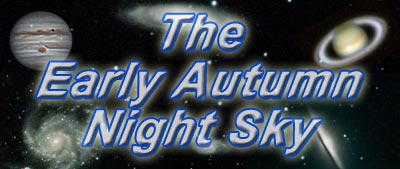
The Evening Sky for September - October, 2019:
The Planets:
Jupiter and Saturn appear in the southern to SW evening sky at sunset but set around midnight. Neptune is now at opposition which is closest to earth for the year, but it is 2.7 billion miles away and you need a telescope to see the icy blue planet. Uranus, the other outer gas giant is in the eastern sky by 10 pm. It is barely visible to the naked eye but you need a telescope to see its geen glow and bands. Like Neptune, Uranus is far away and is about 1.7 billion miles away. (I hope to photograph these two planets this month.) Venus and Mercury are lost in the evening solar glare with Mercury becoming visble low in the western sky by the end of September and Venus, which is sometimes known as the 'Evening star' will slowly becoming visible by month's end and moreso in October and will dominate the WSW evening sky November and December. Mars is lost in the morning solar glare in September and will slowly become vislbe in October early in the morning about an hour before sunrise.
| Click on any Picture for Full View and More Information | |||
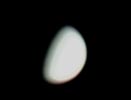 Venus |
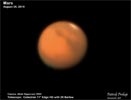 Mars |
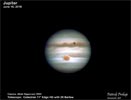 Jupiter |
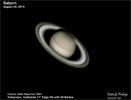 Saturn |
| All Pictures Taken in My Heavenly Backyard with my Telescopes | |||
The Heavens
As Orion is now beginning to enter the nighttime arena along with the 'seven sisters' of the Pleiades. They are rising around 1 am and will rise about 4 minute earlier each night so by the end of October, the fuzzy patch of stars of the Pleiades will be high in the NE by 10 pm and Orion making his apperance shortly after midnight. High in the NE sky is the farthest object you can see with the naked eye; the Andromeda Galaxy. As viewed through binoculars or a small telescope, it appears a fuzzy large white star. However, if you are able to make a time-lapse telescopic exposure, (usually 1-3 hours or more) then you will see the grandure of the closest galaxy to us with its one trillion stars! (Our Milky Way Galaxy contains about a quarter trillion stars). Also coming into telescopic view are the Ring Nebula, Orion Nebula, Rosette Nebula, and the Horsehead Nebula. There are so many objects awaiting for us to view in a sky near you. (All the pictures were taken in my 'Heavenly Backyard'.)
| Click on any Picture for Full View and More Information | |||
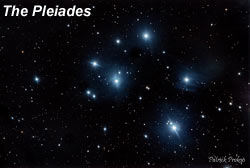 The Pleiades |
 Orion Nebula |
 Andromeda Galaxy |
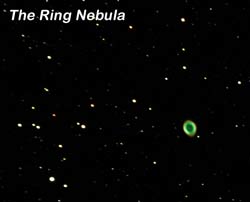 Ring Nebula |
 Crab Nebula |
 Dumbbell Nebula |
 Horsehead Nebula |
 Rosette Nebula |
| All Pictures Taken in My Heavenly Backyard with my Telescopes | |||
Want to see more? ... Go to my Heavely Backyard Astronomy page: I will continue to add more images of the nighttime sky from my backyard and post on my astronomy page, My home page of Savannahpat.name and my Weather and Nature Facebook page along with any videos on my My You Tube Page ... All these pictures taken in my 'Heavenly' backyard.
